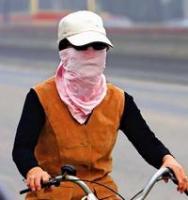Researchers, writing in the journal Proceedings of the National Academy of Sciences , said clean-air legislation has reduced production of industrial aerosols – fine particles of dust, soot and sulphur – in Europe and North America. The opposite trend is seen in Asia, however, where industrialization has led to formation of a pollution haze.
This is especially marked in winter as coal burning increases; sulphur emissions have increased by more than one-third over the last decade.
These aerosols drive cloud formation, as water droplets coalesce around the tiny particles. Cloud coverage for the period 1994-2005 was between 20% and 50% higher than in the preceding decade, bringing growth in storminess – the “storm track” – over the ocean.
Studies suggest accumulation of these particles is changing the properties of Arctic ice, making it absorb more of the Sun’s energy. Thus the ice is more prone to melting, and Earth’s capacity to reflect solar energy back into space is reduced.
Subscribe to our newsletter
Stay up to date with DeSmog news and alerts






